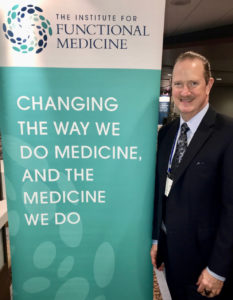What Is Functional Medicine?

Functional medicine, at the simplest level, is about finding the root cause of symptoms or disease — then developing a personalized, actionable plan to address those root causes.
Chronic disease is usually preceded by a period of declining function of the cells and organs. Just like when a car ages, it still runs but gradually functions less well, less efficiently; other systems in the car are then affected/worn down in a domino fashion. Unless the those underlying problems are addressed, the car will eventually develop a flagrant problem. Fortunately, car parts are easily replaceable. Not so easy with humans!
Returning to health requires improving cellular functions and correcting imbalances between core body systems, before they become permanent patterns of dysfunction resulting in potentially irreparable harm. Functional medicine seeks to identify and directly address the underlying causes of cellular dysfunction and imbalances to the body systems. By intervening earlier in the course of imbalances or dysfunction, we hope to prevent progression to overt disease. Even if disease is established, addressing the underlying patterns of dysfunction or imbalance may reverse or substantially mitigate its effects. Traditional medicine often is obliged to wait until disease is diagnosable (i.e., by an ICD-10 code) before treatments can be justifiably started (i.e., services which may be covered/reimbursed by 3rd party payers). Additionally, treatments themselves are often narrowly aimed at management of disease markers (i.e., blood sugar regulation), rather than the root or underlying causes (i.e., metabolic syndrome for type 2 diabetes). Even though lifestyle factors are almost always suggested as first line measures in combating various diseases, modern medicine has fallen short of providing a meaningful way to impact these factors. One reason for this is the extremely short visit times (average 11 minutes of actual time provider to patient), much of which is occupied by attention to the electronic medical record. There is simply no time to address complex lifestyle issues on top of the onerous requirements of documentation to justify billing a third party payor or meeting other imposed requirements. In functional medicine, our longer visit times (up to 90 minutes) allow better exploration of deeper issues and foster patient-provider engagement in formulating a personalized lifestyle plan. We serve you, the patient, and not a third party payor.
Functional medicine recognizes every individual is the sum total of their genetic makeup, environmental exposures, lifestyle factors intertwined with their mental, emotional and spiritual factors. All of these unique influences result in the individual’s expression of dysfunction or, conversely, heath. In other words, health is in some part under an individual’s control. Recognizing this may empower an individual to address their health issues and may restore hope. Something that is sorely missing from the modern mainstream medical paradigm. At the present time we can’t change genetics — those genes we inherit from your parents, but fortunately, their expression is, in some part, under our direct control. That last fact escapes most people’s attention, including physicians! Science has called this phenomenon “epigenetics” which is Latin for “on top of” the genetics. In essence, genes load the gun, but it’s environment that pulls the trigger. At Peak Health, this is one of our mantras.
Functional medicine informs us about how the body systems relate to, and influence each other, in the context of a lifetime of exposures such as chemicals, mold, chronic infections, stressors, injury, diet, inflammation, and genetic expression. We can apply the knowledge gained through advanced testing in a strategy to correct underlying imbalances and mitigate the progression of dysfunction into disease.
How is Functional medicine different from conventional medicine?
If one has an acute injury or infection, conventional medicine has an astounding ability to react and treat (just go to the ER)! Beyond that type of scenario, however, conventional medical practice has become more of a “Disease Management” system, prescribing medicines to blunt symptoms or improve test results, with the hope of preventing complications. This can end up suppressing or masking symptoms, and creates diseased patients dependent upon interventions (medicines, procedures, devices, etc.) for the rest of their life.
We have become a nation of chronic disease. Modern medicine seems ill-equipped to prevent it.
The outcome of a conventional medical encounter is to assign the patient a diagnosis, because only then can a treatment be offered. As physicians, we can attest to this. This is the main tenant of our training. After all, diseases and their treatments are learned in medical training. If one does not meet criteria for a diagnosis, then the treatment is often unclear, which is frustrating for both the patient and the doctor. Doctors truly do want to help, but often feel powerless without a diagnosis.
The problem here is that the cell & organ function that is disturbed, but not disturbed enough to meet disease “criteria”, is still a smoldering, ongoing problem for the individual. It may be preventing them from enjoying the fullest and most vibrant expression of health.
~~~
What’s missing is the need to look deeper for causes or enablers of the problem/disease so that they can be addressed… and then look for the cause of those causes!
This is like peeling away the layers, to expose the deepest portions, and get at the core of the problem.
The end goal of course, will be to reverse the dysfunction and return to peak function.
Sachin Patel, DC says we “Identify the root cause and then train and empower the patient to take the best care of themselves as possible”.
Copyright 2018, Peak Health LLC
